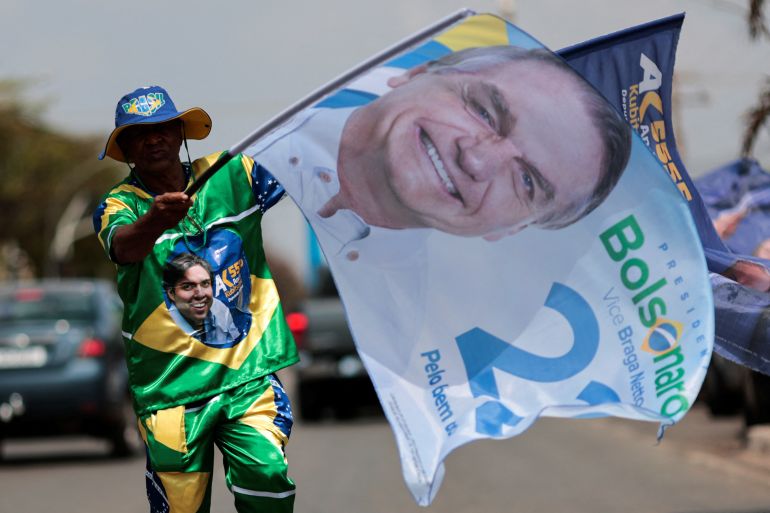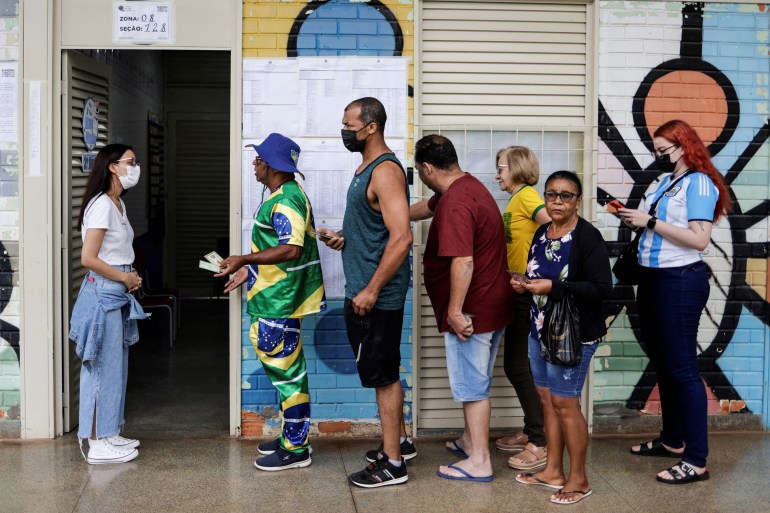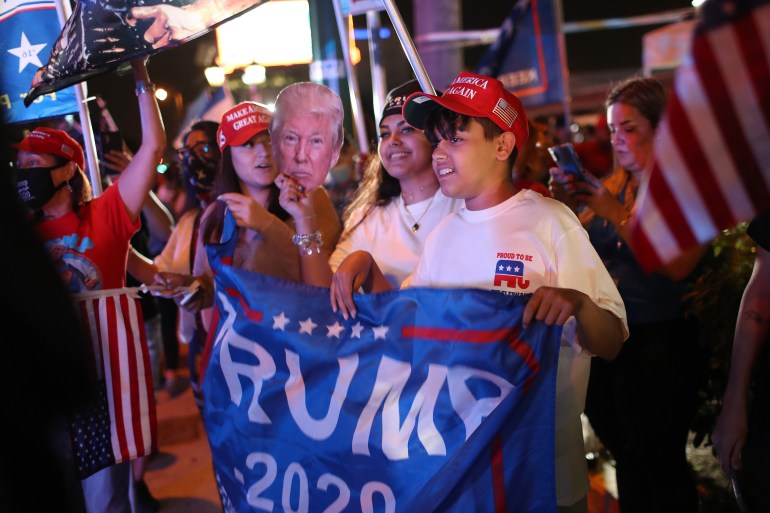How did Brazil’s pollsters underestimate support for Bolsonaro?
Distrust in state institutions and right-wing voters’ reluctance to share their intentions play a role, experts say.

Far-right Brazilian President Jair Bolsonaro left pollsters scratching their heads this week, after he secured millions more votes than expected in the country’s October 2 election, despite ending up in second place behind his left-wing rival Luiz Inacio Lula da Silva.
Bolsonaro finished the first round with 43.2 percent support compared with 48.4 percent for Lula, according to Brazil’s Superior Electoral Tribunal, forcing a run-off on October 30 as neither candidate was able to secure more than 50 percent.
Keep reading
list of 3 itemsUnpacking the results of Brazil’s heated presidential election
Brazil votes: Bolsonaro allies stand firm in Amazon bastion
Yet prior to the election, renowned polling agencies such as IPEC and Datafolha had shown Lula, who served as Brazil’s president from 2003 to 2010, with an advantage of as many as 14 percentage points over Bolsonaro.
The former army captain‘s surprisingly successful showing is one of several examples in recent years where polling has been off the mark, experts said, especially when it comes to support for right-wing and far-right politicians.
Gustavo Flores-Macias, a professor in the Department of Government at Cornell University in the United States, said the Brazilian election results showed that pollsters “clearly haven’t figured out” how deep support runs for the country’s right-wing.
“It gives a sense the polls cannot be trusted, or the integrity of the election is in question,” he told Al Jazeera.

Global phenomenon
Brazilian polling agencies are not alone in underestimating support for right-wing figures.
In 2016, Donald Trump’s US presidential election victory over Hillary Clinton sent shockwaves around the world. And while Trump lost in 2020 to current US President Joe Biden, he still managed to once again outperform in the polls.
India’s Prime Minister Narendra Modi in 2019 also stunned observers after winning an outright majority, despite most pollsters predicting that he would need to form a coalition government.
According to Flores-Macias, one reason support for right-wing and far-right candidates is underrepresented globally is due to hesitance on the part of their supporters to reveal their real plans on Election Day.
“This often has to do with social desirability bias – in that a lot of voters a reluctant to show their true preferences, thinking that if they do it’s not the response that is politically correct or socially acceptable,” he said.
Bolsonaro has been widely criticised at home and abroad for remarks disparaging minorities, including members of the LGBTQ community; his government’s handling of the COVID-19 pandemic; destruction of the Amazon rainforest, and support for mining and other economic projects that rights groups have said have led to a surge in violence against Indigenous people.
The far-right leader “represents social conservatism in the country”, said Flores-Macias, and his supporters may not want to reveal that they support such views.

Distrust in institutions
For months, Bolsonaro also sowed distrust in Brazil’s electronic voting system, saying without evidence that it was vulnerable to fraud, and attacked Supreme Court justices in what Brazilian political observers said had sparked an “unprecedented crisis” in public trust.
That distrust and suspicion in state institutions is another reason why far-right voters are less willing to talk to pollsters, experts said.
“Polls often rely on people’s goodwill and trust in the organisations carrying out the polls,” said Christopher Hanretty, a professor of politics at Royal Holloway, University of London.
“Far-right parties often draw support from people who don’t have a lot of trust in others. This means that people who support far-right parties are more likely to decline requests to be interviewed,” he told Al Jazeera in an email.
Lawrence Rosenthal, chair of the Berkeley Center for Right-Wing Studies at the University of California, Berkeley, said this phenomenon also exists in the US among evangelical Christian voters, who live in “self-exile” from mainstream institutions that they perceive as having a liberal bias.
“If you are convinced the mainstream media and pollsters from academic institutions and agencies lie … and you get your news for right-wing sites like Breitbart, you are not going to be the type of voter pollsters assume have a kind of predisposition to answer sincerely,” Rosenthal said.
A The Hill-HarrisX poll in 2018 showed that while a majority of Americans were doubtful about survey accuracy, only 36 percent of Republicans said polls were mostly or almost always accurate, compared with 60 and 49 percent of Democrats and independents, respectively.
Polls not getting ‘worse’
Despite these shortcomings, Hanretty said polling “hasn’t gotten worse” over time, instead pointing out that “everyone forgets the times polls got the results right.”
The victory of a right-wing-led coalition in Sweden last month by the slimmest of margins was accurately predicted by most polls, for example, and the same scenario played out in Italy when far-right leader Giorgia Meloni’s party won the most votes in September’s general elections.
“It’s probably not about right-wing candidates … Polls can underestimate left-wing parties if they are in some sense populist or ‘anti-system’ parties,” said Hanretty, pointing to how polls accurately predicted the success of Italy’s centrist and populist Five Star Movement in 2013.
Sanjay Kumar, a political analyst at The Centre for the Study of Developing Societies in New Delhi, India, said vote-share underestimation is unlikely based on ideological grounds, but rather an attempt by pollsters to provide balance in their findings and “maintain their own integrity”.
“Whenever an agency finds there is a very high vote share for any one party,” he told Al Jazeera, “there is a tendency to moderate … to make adjustments in order to remain on the safe side.”
Nevertheless, miscalculations by polling agencies have the potential to encourage conspiracy theories and could fuel further distrust in state institutions, said Flores-Macias at Cornell University.
In Brazil, Bolsonaro spent weeks denouncing polls that showed him trailing Lula as inaccurate. “Bolsonaro consistently [made] very serious accusations about the elections beforehand,” Flores-Macias said.
“This [underestimation of Bolsonaro’s vote share] results in people thinking, ‘Well, Bolsonaro clearly knew these polls were wrong,’ and feel there was an attempt to fool the population or steal the election.”